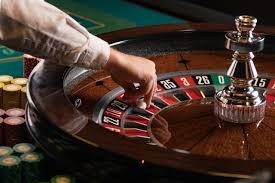The Casino House Edge Explained: How Casinos Win and How You Can Play Smarter
Discover what the house edge really means in casinos. Learn how it affects your odds, why it exists, and how to use this knowledge to gamble smarter and stay in control.
CASINO TIPS
9/4/20256 min read
The Casino House Edge Explained: How Casinos Win and How You Can Play Smarter
When you walk into a casino, you’re stepping into a world designed to excite you, entertain you, and tempt you with the possibility of winning big. The flashing slot machines, the spinning roulette wheels, the shuffle of cards—all of it creates a sense of opportunity. But there’s something most players don’t fully understand: every single game in a casino is built to give the house an advantage.
That advantage is called the house edge. It’s the reason casinos can stay open 24/7, hand out free drinks, and create stunning resorts while still making money. The house edge doesn’t mean you can’t win—people win all the time—but it explains why, over the long run, the casino always comes out on top.
This guide will break down what the house edge is, how it works, and what it means for you as a player. By the end, you’ll see casinos in a whole new light—and you’ll learn strategies to enjoy gambling without falling into traps.
1. What Exactly Is the House Edge?
At its core, the house edge is the mathematical advantage the casino has over players in every game. It’s expressed as a percentage, showing how much of each bet the casino expects to keep as profit over time.
For example:
If a game has a 5% house edge, you can expect to lose about $5 for every $100 you bet in the long run.
This doesn’t mean you’ll lose exactly $5 every time—it’s an average calculated over thousands of bets.
Think of it like a small built-in “fee” for playing. The house edge ensures the casino makes money while giving you a fair shot to win.
2. Why Casinos Always Have the Edge
Casinos aren’t charities—they’re businesses. They design games with odds that slightly favor them so they can make a consistent profit. Without the house edge, casinos wouldn’t exist.
Here’s why it matters:
Fair but Profitable: The edge is small enough that players feel they have a real chance, but large enough for casinos to earn money.
Predictability: A casino can predict its earnings because the edge is based on math, not luck.
Excitement for Players: The edge is subtle. Players can—and do—win, which keeps the excitement alive.
This is why gambling is entertaining but also why you should approach it with knowledge and caution.
3. How the House Edge Works: A Simple Example
Let’s use roulette as an example. In American roulette, the wheel has 38 pockets: numbers 1–36, plus a 0 and 00. If you bet on a single number, the payout is 35 to 1.
If there were no house edge, the payout would match the actual odds, which are 1 in 38. But because the payout is 35 to 1, the casino keeps the difference.
Here’s the math:
The true odds of winning are 1/38 (about 2.63%).
The payout is 35/1.
Over time, this gives the casino a 5.26% house edge on every single bet.
That means if you bet $100 over multiple spins, you can expect to lose around $5.26 on average. It doesn’t sound like much, but when thousands of players place hundreds of bets per hour, the casino’s profits soar.
4. Different Games, Different Edges
The house edge varies by game. Understanding this can help you choose games wisely.
Slots
Slot machines are flashy and fun, but they often have the highest house edge—sometimes 8% to 15% or more. That means you’ll lose more money over time than in table games.
Roulette
American Roulette: 5.26% edge.
European Roulette: 2.7% edge (because it has only one zero).
Blackjack
Blackjack is one of the lowest-edge games—0.5% to 1% if you play perfectly.
Baccarat
A bet on the banker has a 1.06% edge, making it a smart choice for low-risk play.
Craps
Depending on your bets, the house edge can be 1.4% or even less.
Poker
Poker is different because you’re playing against other players, not the house. The casino makes money through a “rake” (a small percentage of the pot).
5. The Hidden Power of the House Edge
What makes the house edge so effective is that it works quietly over time. You might win big one night, but if you keep playing long enough, the math catches up.
For example:
If you play a slot machine with a 10% edge and bet $5 per spin for 200 spins, you’re betting $1,000 total.
Over time, you’ll lose about $100 on average.
It doesn’t feel like you’re losing that much because it happens slowly. That’s how casinos keep you engaged while still making money.
6. Variance vs. House Edge
The house edge tells you how much you’re likely to lose over time, but variance explains the ups and downs along the way.
High-variance games (like slots) give you rare big wins but eat away your bankroll quickly.
Low-variance games (like blackjack) give you smaller wins and losses, keeping your bankroll steady.
Understanding both helps you pick games that match your goals: thrill-seeking or steady entertainment.
7. How the House Edge Shapes Casino Design
The house edge isn’t just about numbers—it’s part of everything in a casino’s design.
Bright Lights and Sounds: These stimulate your brain and encourage you to keep playing.
No Clocks or Windows: Casinos don’t want you thinking about time; they want you focused on the games.
Complimentary Drinks: Free alcohol relaxes you and makes you less cautious about your bets.
Once you know how the house edge works, you’ll start to see casinos differently. It’s not just about luck; it’s about a carefully engineered system designed for profit.
8. Tips to Use House Edge Knowledge to Your Advantage
Understanding the house edge doesn’t mean you’ll beat it, but it can help you gamble smarter:
Choose Games with a Low Edge
Stick to blackjack, baccarat, and European roulette for the best odds.
Learn Optimal Strategies
Games like blackjack have strategies that can lower the edge even more.
Set a Budget
Decide how much you’re willing to spend before you walk in and stick to it.
Play for Entertainment, Not Profit
The house edge is unbeatable over time. If you see gambling as entertainment, you won’t feel disappointed when you lose.
Take Breaks
Walking away helps you avoid emotional decisions and keeps you in control.
9. The Psychology of the House Edge
The casino’s edge doesn’t just come from math; it comes from psychology. They know how players think:
The Gambler’s Fallacy: Believing you’re “due” for a win after a losing streak.
Near-Miss Effect: Slot machines often show results close to a win to encourage more play.
Chasing Losses: Players often bet more to recover losses, which plays into the casino’s hands.
Knowing this helps you avoid common traps.
10. The Long-Term Reality of Gambling
The house edge proves one thing: casinos always win over time. That doesn’t mean you shouldn’t gamble—it means you should gamble smart. Treat it like buying a movie ticket or going to a concert. You’re paying for fun and memories, not a guaranteed profit.
Here’s the truth:
Big wins are rare, but they do happen.
The longer you play, the more likely you are to lose money because of the edge.
Responsible gamblers know when to stop and enjoy their winnings.
11. Real-Life Example: Why the Edge Works
Imagine two friends each walk into a casino with $100:
One plays blackjack with a 1% edge.
The other plays slots with a 10% edge.
If they each bet their $100 evenly, here’s what happens over time:
The blackjack player loses about $1 per $100 bet.
The slots player loses about $10 per $100 bet.
That difference is massive over weeks or months of play. Understanding this helps you make better choices.
12. Can You Beat the House Edge?
In most cases, no—you can’t beat it in the long run. But there are exceptions:
Card Counting in Blackjack: Skilled players can slightly tilt the odds in their favor, but casinos are strict about catching card counters.
Poker: Since you play against other players, skill matters more than luck.
Promotions and Bonuses: Some casinos offer promotions that temporarily give players better odds.
For the average gambler, the goal shouldn’t be to beat the edge—it should be to enjoy the game while staying in control.
13. Online Casinos and the House Edge
Online casinos use the same principles as brick-and-mortar ones, but they’re often more transparent. Many online games display their Return to Player (RTP) percentage, which is just the flip side of the house edge.
A game with 96% RTP has a 4% house edge.
Knowing RTP helps you pick games with better returns.
14. Why the House Edge is Good for Players Too
Believe it or not, the house edge isn’t all bad:
Keeps Casinos in Business: Without it, there would be no casinos, no jackpots, no entertainment.
Small Enough to Let You Win: If the edge were too big, no one would play.
Adds Excitement: The possibility of winning big against the odds is part of the thrill.
15. Final Thoughts
The house edge is the foundation of every casino game. It’s a mathematical guarantee that the casino will make money over time, but it’s also the reason you can enjoy gambling safely and fairly.
Here’s what you should take away:
The house edge is real and unavoidable.
Knowledge is power: choose games with lower edges to stretch your money.
Gambling should always be about entertainment, not income.
Next time you step into a casino, you’ll see things differently. Instead of blindly playing, you’ll understand exactly how the games are built and how to enjoy them responsibly. The house may always win, but that doesn’t mean you can’t walk away a smarter, happier player.




© 2026 All rights reserved.
Follow us
Quick Links


